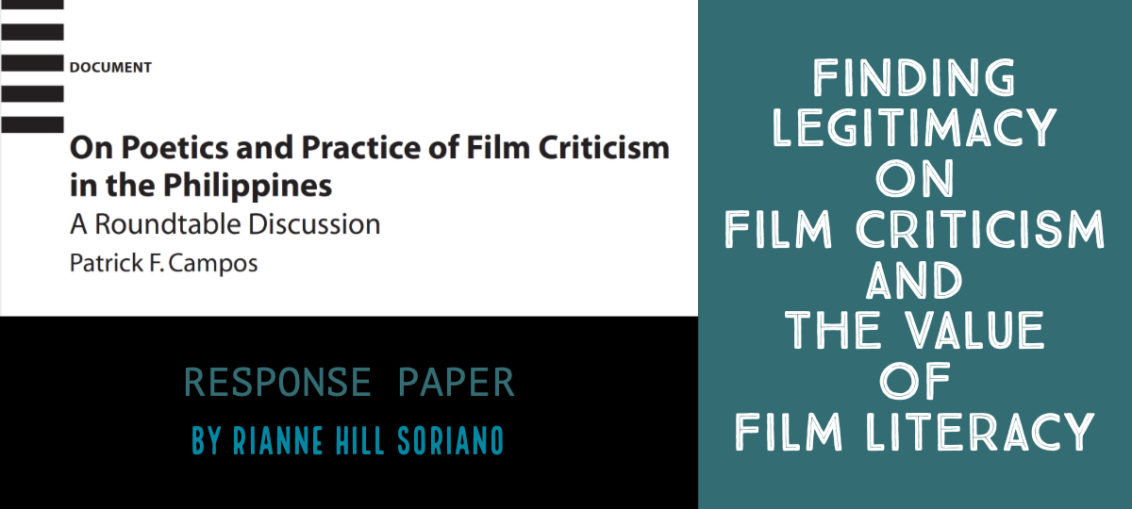In response to: “The Evolution of the Language of Cinema” from the book “What is Cinema?” by Andre Bazin A response paper for my Advanced Film Theory and Criticism class Andre Bazin expressed in this reading “The Evolution of the Language of Cinema” from his book “What is Cinema?” his conviction that sound is not there to destroy cinema – it is just part of the natural development of the medium. In discussing film as an art and language, he presented how the cinema
Author: Rianne Hill I. Soriano
(Response Paper) Cinema as an Invention, Art, and Idealistic Phenomenon with Andre Bazin
In response to: “The Myth of Total Cinema” from the book “What is Cinema?” by Andre Bazin A response paper for my Advanced Film Theory and Criticism class The Andre Bazin reading “The Myth of Total Cinema” from his book “What is Cinema?” focused on the desire of humans to find a representation of reality as complete as possible, rooted from the innovations in cinema, by discussing techniques of mechanical reproduction of reality. This started in the nineteenth century, then carefully moved on
(Response Paper) Sigfreid Kracauer’s Photographic Reality, Cinematic Illusion, and Everything Else in Between
In response to: “Sigfried Kracauer: From Theory of Film – Basic Concepts” from the book “Film Theory and Criticism: Introductory Readings” by Leo Braudy and Marshall Cohen A response paper for my Advanced Film Theory and Criticism class In this reading entitled “Sigfried Kracauer: From Theory of Film – Basic Concepts” from the book “Film Theory and Criticism: Introductory Readings” by Leo Braudy and Marshall Cohen, realist film theorist Sigfried Kracauer highlighted the crucial role of photography in the development of moving picture.
(Response Paper) Editing in Its Early Form with Vsevolod Pudovkin
In response to:“Vsevolod Pudovkin: From Film Technique (On Editing)” from the book “Film Theory and Criticism: Introductory Readings” by Leo Braudy and Marshall Cohen A response paper for my Advanced Film Theory and Criticism class This chapter entitled “Vsevolod Pudovkin: From Film Technique (On Editing)” from the book “Film Theory and Criticism: Introductory Readings” by Leo Braudy and Marshall Cohen showed how early on, editing played a significant role in convincing the world that film is an art form. Soviet filmmaker Vsevolod
(Response Paper) Looking Beyond the Vestiges of Film Language
In response to: “Film Language,” from the book “Film Theory and Criticism: Introductory Readings” by Leo Braudy and Marshall Cohen A response paper for my Advanced Film Theory and Criticism class From formalist to realist to post-structuralist approaches, starting with montage and moving further with psychoanalysis and the system of the suture, the chapter “Film Language” in the book “Film Theory and Criticism: Introductory Readings” by Leo Braudy and Marshall Cohenpresented how different film theorists, through the decades, have paved way to
(Response Paper) Finding Legitimacy on Film Criticism and the Value of Film Literacy
In response to: “On Poetics and Practice of Film Criticism in the Philippines - A Roundtable Discussion and Videos” by Patrick Campos, published at the Plaridel Journal A response paper for my Advanced Film Theory and Criticism class After watching over 3 hours, 40 minutes of productive discussion of the University of the Philippines Office of Research and Publication project entitled "On Poetics and Practice of Film Criticism in the Philippines - A Roundtable Discussion and Videos," it was interesting and eye-opening
(Response Paper) The Conundrum in the Stars: Appeasing the Human Mind with Art and Criticism
In response to: “What is Criticism? (A Preliminary Dialogue)” and “The Critic as Artist and Vice Versa” in the book “Better Living Through Criticism: How to Think About Art, Pleasure, Beauty, and Truth” by A. O. Scott A response paper for my Advanced Film Theory and Criticism class After reading “What is Criticism? (A Preliminary Dialogue)” and “The Critic as Artist and Vice Versa” in the book “Better Living Through Criticism: How to Think About Art, Pleasure, Beauty, and Truth,” writer A.O.
(Response Paper) Besides Perfection: The Nooks and Cranny of Film Reviewing with Anthony Lane
In response to: The introduction of the book “Nobody’s Perfect: Writings from the New Yorker” by Anthony Lane A response paper for my Advanced Film Theory and Criticism class The introduction part of Anthony Lane’s book “Nobody’s Perfect: Writings from the New Yorker” was a nurturing read, while reminding me of how movies for spectacle’s sake work like junk food – indulging instead of nourishing. At the same time, in the ages of video games and social media, movies work like many
(Response Paper) Pauline Kael’s Journey to the Two Sides of the Spectrum
In response to: “Replying to Listeners” in the book "I Lost It at the Movies" by Pauline Kael and the blog post “Trash and Art: Critics on/of Pauline Kael” by Jim Emerson in the RogerEbert.com blog "Scanners with Jim Emerson" A response paper for my Advanced Film Theory and Criticism class Pauline Kael (1919 to 2001), is a household name in American film criticism, as well as a familiar name cited when looking for film books for academic use, as far as
(Response Paper) Discourse in Art: Beyond Interpretation, Form, and Content
In response to: “Against Interpretation,” an essay by Susan Sontag A response paper for my Advanced Film Theory and Criticism class The way writer Susan Sontag used the word “interpretation” in this reading prompted me to dig deeper into the application of the word in film criticism and art as a whole. I would say I don’t agree with her when she said that art, especially at this time and age, should not be interpreted. She specifically raised how "commentary about art"










